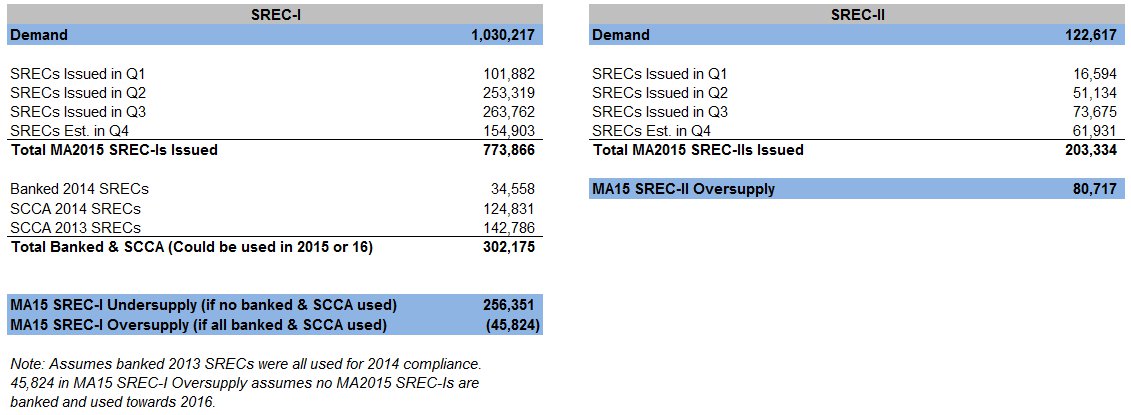On July 6th, the Commonwealth of Massachusetts Department of Energy Resources (DOER) announced that EnerNOC Inc. has posted the Auction Notice and Qualification Application for this year’s Solar Credit Clearinghouse Auction (SCCA) to the Solar Renewable Energy Credits (SREC-I and SREC-II) Auction Announcement Website. The SCCA serves as a price support mechanism for the Massachusetts SREC programs. In over-supplied years (when more SRECs are available than required), buyers are incentivized to purchase SRECs through the SCCA, if they believe that the SCCA price is at or below the potential future price of the SRECs. You can read more about the SCCA here. The 2016 SCCA is scheduled to begin on Friday, July 29th.
SREC Volume
This year, the DOER will conduct Solar Credit Clearinghouse Auctions for both SREC-I and SREC-II certificates. The volumes of certificates available for purchase through each auction are as follows:
MA15 SREC-I: 1,898 certificates
MA15 SREC-II: 66,440 certificates
Multi-tiered Auction
The auction will be divided into two tiers of bidders. The Tier I bidders will consist solely of Retail Electric Suppliers with Renewable Portfolio Standard (RPS) compliance obligations. Up to fifty percent (50%) of the total auction volume will be reserved for Tier I bidders. If bid demand exceeds fifty percent (50%) of the total auction quantity, awards will be made on a pro-rata basis. If there is insufficient demand, each bid received will be awarded and the remaining quantity of SREC-I and SREC-IIs will be made available to Tier II bidders. Tier II bidders consist of all entities, including any Tier I bidders with unfulfilled bids from Tier I. The remaining auction quantity after the Tier I awards have been made will be allocated on a pro rata basis to all Tier II Bidders, as has been done in all prior auctions.
Minimum and Maximum Financial Security Requirements
The separation of Retail Electric Suppliers from Non-Retail Suppliers also stands in the auction’s Minimum and Maximum Financial Security Requirements. For only the SREC-II Auction, all Non-Retail Electric Suppliers without RPS compliance obligations must post at least $10,000 in financial security to participate in the SREC-II Auction. For both the SREC-I and SREC-II Auctions, Retail Electric Suppliers with RPS compliance obligations will be credited an amount of security commensurate with the volume of electric load that they served in 2015. Both Retail Electric Suppliers posting above their credited security and Non-Retail Electric Suppliers without RPS compliance obligations can post an amount no greater than the amount required to purchase ten percent (10%) of the total auction volume. Non-Retail Electric Suppliers in the Commonwealth of Massachusetts without RPS compliance obligations cannot bid on and will not be awarded SREC-I or SREC-IIs in excess of ten percent (10%) of the total auction volume.
Key Dates & Bidder Webinar Registration
Friday, July 8, 2016 – Bidder webinar to review auction process and the Qualification Application
To register for the webinar, click here.
Wednesday July 13, 2016 – Bidder Qualification Application due
Friday, July 29, 2016 – First auction takes place
Questions regarding the SCCA can be directed to the Auction Manager email account at: masrecauctionmanager@enernoc.com.
Tweet

